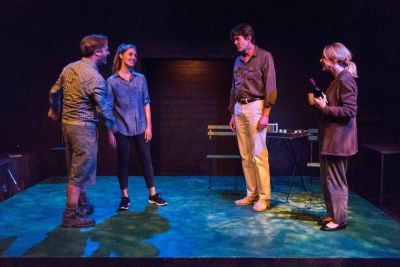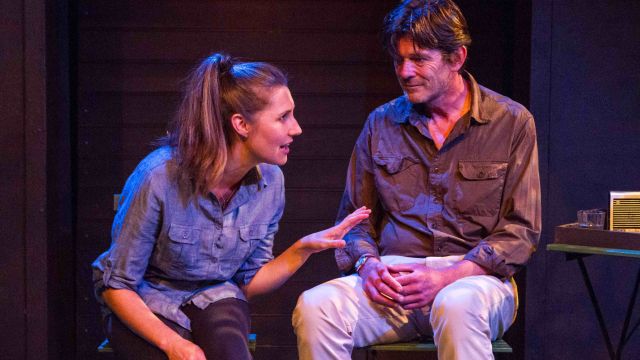The Realistic Joneses
Jennifer Jones (Sarah Sutherland) and Bob Jones (Neil Piggot) sit under a night sky, somewhere in small town USA. It’s so quiet ‘you can hear the clouds passing’. Their stilted conversation suggests at first a marriage that has, maybe, run its course, but you sense that there is something else, something sadder than lack of communication. Jennifer, we’ll come to understand, is, in her own quietly desperate way, heroic, and there’s more to Bob than a blunt curmudgeon. They are interrupted by their new neighbours, Pony Jones (Elsa Caldwell) and John Jones (Justin Hoskin), coming to say ‘hello’ and bringing a bottle of wine. That wine never gets opened. The interlopers are a relief but unwelcome too…
You have to surrender to this play. You have to attend closely and hear Will Eno’s near musical wordplay as his characters circle around their failing attempts to understand each other – or, more likely themselves. They venture half a thought, half a sentence… and then contradict it or withdraw it as unsatisfactory or too revealing or too brave. If you want a plot, there isn’t one. Instead there are revelations – darker and darker - there are awkward encounters between people who are desperate to communicate… but can’t.
You’ll interpret the fact that both couples are called ‘Jones’ as you wish. For me, it means that they are not as different as they seem – and united by being, in the end, ‘realistic’. John Jones talks too much, but doesn’t make much sense and a first impression of Pony is that she is an airhead who tries too hard. Of course, there is a lot more to all of them. Relations between the couples remain awkward, as do relations between John and Jennifer as he is drawn to her solidity; and Bob tries to be more sympathetic to Pony than he is able.

Director Julian Meyrick’s achievement (among many) is to keep this almost formless play moving along and to maintain a sharp ear for the nuances of immensely complex, playful dialogue. (Whether I quite believe his fulsome assessment of Will Eno’s talents in his program note is another matter.) If you can’t immerse yourself in this very different play, you can at least appreciate the great skill of the cast in handling this dialogue and maintaining the credibility of these flawed and foundering characters.
Ella Caldwell, with her natural warmth, builds audience sympathy for Pony, an immature girl, whom we realise is way, way out of her depth: she’s drowning not waving. In this flaky foursome, Sarah Sutherland distinguishes herself by portraying the most grounded and least self-obsessed character – although her Jennifer is on the brink of defeat herself. Justin Hoskin, as John, has perhaps the most tasking role – and he never falters. His John, under all the non-sequitur chatter, is a desperate man, struggling to accept his predicament. Neil Piggot admirably restrains his usual exuberance and attack as Bob – and the tension this creates between what Bob may have been once and what he is reduced to now gives a sad sense of waste.
Gregory Clarke’s set is definitely no frills – not even naturalistic – but perfectly up to requirements. Bronwyn Pringle’s unobtrusive lighting and Ian Moorhead’s sound establish the still nights and the backwater quiet. Mr Clarke’s costumes are beautifully chosen for character: Pony’s teen gear, John’s clumsy boots and cargo pants, Bob’s respectable shirt and Chinos, and Jennifer’s small town ‘stylish’.
This is not a play for everybody. On opening night some people were laughing, but whether that was to encourage the cast or to fend off the sadness of these characters is hard to say. At times I wondered if Mr Eno himself is truly sympathetic to these characters or laughing at them – just a little. At other times a nasty quote hovered: ‘the least people who can’t communicate can do is shut-up.’ Mr Eno has said that he wanted to write a ‘naturalistic play’. I suppose he has. His characters just don’t have the words, let alone the prior experience, to formulate their pain. In the end, there is a kind of acceptance. You wouldn’t exactly call it ‘stoic’, but, as Bob says, ‘What can you do?’
Michael Brindley
Photographer: Teresa Noble.
Subscribe to our E-Newsletter, buy our latest print edition or find a Performing Arts book at Book Nook.

